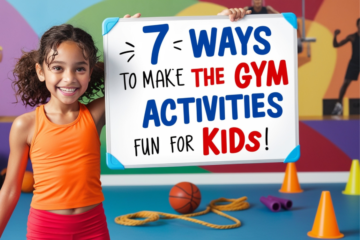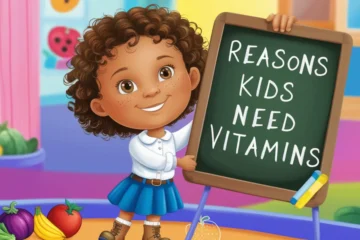Hello people! Promoting health for contented children means fitness for the whole family. Ensuring that children grow up healthy, both physically and psychologically, falls mostly on parents, guardians, and teachers. A well-rounded approach to good habits for children can significantly affect their general growth. Families can create a fitness plan for their children that supports excellent health, physical exercise, and lifetime of habits by means of this article.
Lets discuss it!
Table of Contents
Why Children’s Healthy Habits Matter

Early childhood good habits build the basis for a better future. Studies have revealed that early in childhood children who develop good behaviors are more likely to keep those habits as adults.
The Centers for Disease Control and Prevention (CDC) advise youngsters between the ages of six and seventeen to get at least one hour of daily physical activity. Studies reveal, meanwhile, that many youngsters fall short of this standard, which fuels growing worries about later in life chronic diseases, mental health problems, and childhood obesity.
Furthermore alarming is the CDC’s estimate of 20% of American children and teenagers being obese, which calls for major attention. Childhood obesity raises the risk of many health issues including certain malignancies, diabetes, and heart disease.
The good news is that children’s healthy behaviors—regular exercise, balanced diets, and adequate sleep—can help prevent these problems and support general well-being.
Creating Good Habits for Children
They don’t just encourage physical exercise, they develop a family fitness schedule of healthy practices that you and your kids can practice together including: It pretty much sums at, a happy life and a supporting lifestyle in general well being, mental health, healthy diet, and sleep hygiene. The features of a family fitness program are basically this and if applied would make everybody, even your children happy and healthy.
Make Exercise Enjoyable
Many children find that exercise feels more like a chore than a fun past time. Developing physical activity into a habit requires including it into daily activities in an interesting and enjoyable manner. Family fitness is about movement, pleasure, and encouraging a love of being active—not about running marathons or going the gym.
- Outdoor Games: Great methods to get kids moving and spend quality time with them are biking, hiking, tag-playing, even just a stroll in the park. Studies reveal that outdoor pursuits raise Vitamin D levels, enhance immune system strength, and help to improve mood.
- Sports: expose your child to swimming, soccer, basketball, and dancing among other disciplines. Encouragement of children to engage in many kinds of activities promotes motor skills development and a passion of physical exercise.
- Fitness Challenges: Children can find exercise more fun when family fitness challenges including goal-setting for how many steps to walk or how many laps to run.
- Children are more likely to pick up these good behaviors into adulthood if physical activity is enjoyable and included into their daily schedule.
Promote Good Food Practices

Growing and developing a child depends critically on a balanced diet. Good diet helps the body fight off disease and gives the daily activities’ energy required. Here are some ideas for encouraging youngsters to eat well:
Emphasize healthy Foods to your child’s meals by including lean proteins, a range of fruits and vegetables, healthy grains. These meals abound in vital minerals and vitamins that assist good development and growth.
Reduce processed food consumption: Steer clear of processed foods heavy in harmful fats and added sugars as well as fast food and sweet treats. For young people, the American Heart Association advises keeping added sugars to no more than 25 grams (6 tablespoons) daily.
Instructive Portion Control: Teaching youngsters about portion sizes will help them avoid overindulging as they often eat more than they need. Present smaller servings and help your child to eat slowly so they may learn when they are full.
Engage Children: Allow your youngster to help with meal planning and preparation. This helps children to take responsibility for their eating decisions and motivates them to investigate fresh, better choices.
Key Stat: Children who eat a healthy, balanced diet are 33% less likely to acquire obesity than those who eat more processed foods according a National Institute of Health study.
Give Sleep Top Importance for Best Health
Another absolutely vital component of good behavior for children is sleep. Children aged 6 to 12 should obtain between 9 and 12 hours of sleep every night, claims the American Academy of Sleep Medicine. Physical, cognitive, and emotional development all depend on appropriate rest. Here’s how you might guide your children toward good sleeping practices:
Create a Regular Nighttime Schedule
consistency is essential. Though on weekends, try to have your youngster go to bed and wake up at the same time every day. This guarantees higher quality of sleep and helps control their internal clock.
Restrain Screen Time before Bed
Before bed, screen time—from TVs, tablets, and cellphones—can disrupt sleep. The blue light coming from screens suppresses melatonin, the hormone in charge of controlling sleep. Try to shut off electronics at least one hour before bed.
Establish a Calm Environment
Make sure your child sleeps in a peaceful, dark, cool surroundings. How well someone sleeps can be much influenced by a comfy bed and a peaceful surroundings.
Key Stat
Children who get enough sleep are 20% more likely to have better academic performance and higher daily energy levels, according a study that was written up in the journal Sleep Health.
The following video explains about Good Sleep:
Advance Emotional and Mental Health Well-being
Though physical health is simply one factor, mental wellness is equally crucial. Encouragement of healthy behaviors for children also entails support of emotional well-being. With estimates suggesting a 25% increase in mental health difficulties among children and adolescents since 2019, mental health concerns including anxiety, despair, and stress are on the rise in youngsters.
Some Things you can do to Help Kids’ Mental Health
- Encourage your youngster to share their ideas and emotions in open communications. Frequent communication with them on their feelings, challenges, and pleasures helps to Children benefit from open communication in feeling heard and understood.
- Consciousness and Relaxation Teach your youngster basic yoga, progressive muscular relaxation, or deep breathing. These exercises can improve children’s emotional control and attentiveness as well as assist them manage stress.
- Restrain Stress: Help your child to prevent too demanding activities. Burnout and stress resulting from overscheduling are common. To prevent overburden your youngster, strike a mix between academics, extracurricular activities, and downtime.
- Key Stat: The American Psychological Association (APA) estimates that 20% of children between the ages of 13 and 18 have a mental health illness and 30% of youngsters overall suffer from notable stress. Regular physical exercise will help to greatly lower stress and raise general mood.
Set an Example: Take on a Role Model
Youngsters are more likely to pick up good behaviors if they observe their parents or other caregivers doing them. Being the main impact on your child’s life, your behavior speaks more loudly than words. Your child will be more likely to have a good attitude toward physical exercise, good food, and mental health if you yourself do these things.
- Whether it’s a morning run, family yoga class, or weekend trek, schedule regular family exercise. When children spend time with their parents, they like it; and you will all gain from the physical activity.
- Eat healthier Together: Your child will be more likely to sample healthier meals if they observe you enjoying them. Try cooking meals as a family and play about with fresh ideas together.
- Engage in self-care: Show your kids the need of maintaining both physical and mental wellness. Spend time for yourself—reading, meditating, working out, or otherwise—then share the advantages of self-care with them.
- Key Stat: Studies indicate a 40% increase in the chance of physical activity in children with active parents; the American Academy of Pediatrics claims that children whose parents exercise regularly are more likely to be active themselves.
Conclusion
Eventually, developing good habits for children is a family affair.
Adopting good habits for children is about establishing a whole environment where your entire family values health and well-being, not only about pushing your child to eat more vegetables or exercise more.
All of physical activity, good nutrition, enough sleep, and mental well-being are related. Regularizing these behaviors for your family will help to equip your children for long-term health and happiness.
Recall that in the life of your child, you are the most powerful role model a parent can provide. Leading by example will enable you to help create lifetime of good habits.
FAQ
1. Why do kids need to have some healthy habits?
A healthy kid has a minimum of 1 hour of physical activity daily, a healthy diet (fruits, vegetables, whole grains) and adequate sleep (9-12 hours) and performing well in emotional health (stressmanagement and mindfulness).
2. Well how do we get our kids to exercise!
Do some outdoor games, try new sports, engage in family fitness challenges, dance to music at home, or have you ever studied the facial features of your family members?
3. How much should my child be sleeping?
On average, healthy children 6 to 12 years old and teens 13 to 18 years old need 9 to 12 and 8 to 10 hours of sleep respectively.
4. But first how do you eat away my child’s screen time before sleep?
Get an hour “screen free” before bed to read or do quiet things. If you own devices, keep them out of the bedroom at night.
5. What does physical activity do for a person’s mental health?
This may help to reduce stress, improve mood, promote sleep and improve self esteem, all of which promote healthier mental health.
6. How do I create healthy habits that my kids can watch me do in the first place?
These are things we can all actively model by such things as good exercise, good foods eaten, good self care and a good routine.




